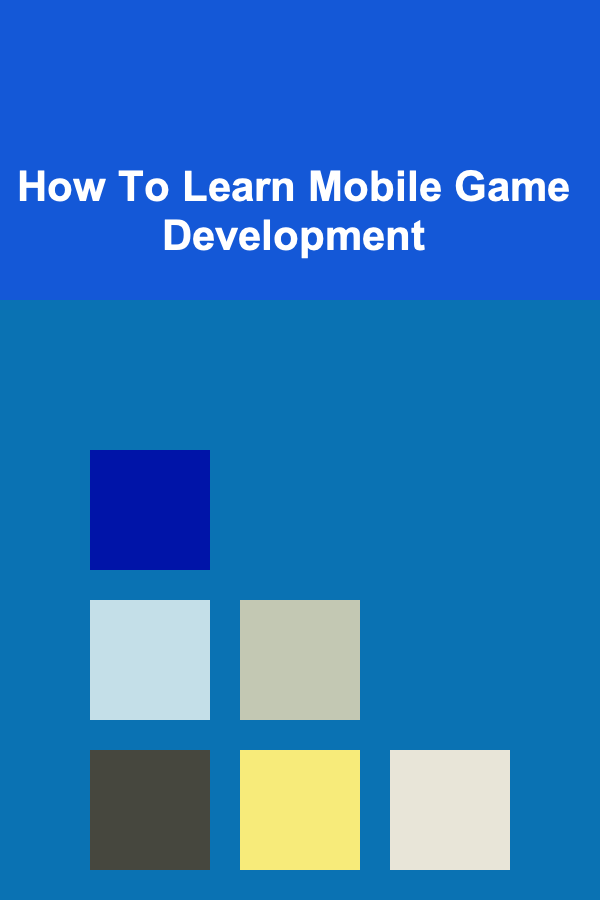
How To Learn Mobile Game Development
ebook include PDF & Audio bundle (Micro Guide)
$12.99$8.99
Limited Time Offer! Order within the next:

Mobile game development is an exciting and fast-paced field, with opportunities to create games that can reach millions of players worldwide. Whether you're a complete beginner or an experienced developer looking to dive into mobile game development, this guide will provide you with the necessary knowledge and resources to embark on this rewarding journey.
Understanding Mobile Game Development
Before you begin, it's essential to grasp what mobile game development entails. At its core, mobile game development involves designing, coding, testing, and deploying games on mobile platforms, such as iOS and Android. Mobile game development differs from traditional desktop game development in many ways, including the hardware limitations of mobile devices, screen size, touch interfaces, and the need for optimizing performance to ensure smooth gameplay.
Why Mobile Game Development?
The mobile gaming industry has exploded over the past decade, driven by the ubiquity of smartphones and the accessibility of app stores. Here are a few reasons why learning mobile game development can be a great career choice:
- Large Audience: Mobile games are among the most downloaded apps globally, with billions of active users.
- High Revenue Potential: Mobile games can generate significant income through in-app purchases, ads, and premium app downloads.
- Wide Reach: Mobile games allow developers to reach a diverse global audience across various demographics.
- Low Entry Barrier: Compared to console or PC game development, mobile game development typically has a lower entry barrier in terms of hardware and software.
Now that you understand the importance of mobile game development, let's break down the steps you can take to learn this skill.
Step 1: Learn the Basics of Programming
To get started with mobile game development, you need to have a strong foundation in programming. There are a few key programming languages used in mobile game development, including:
- C# (used primarily with Unity)
- Java (used primarily for Android game development)
- Swift (used for iOS game development)
- Kotlin (another option for Android)
- C++ (used in some game engines)
If you don't already have programming experience, start by learning one of these languages. C# is an excellent choice for beginners because it's relatively easy to learn and is used in the popular Unity game engine.
Resources for Learning Programming:
- Codecademy: Offers beginner courses in several programming languages, including C#, Java, and Swift.
- Udemy: There are numerous affordable courses on mobile game development in various programming languages.
- freeCodeCamp: Offers free coding tutorials and exercises for beginners.
- YouTube: Channels like Brackeys (for Unity) and The Coding Train (for various languages) offer comprehensive, free video tutorials.
By understanding the basics of programming, you'll be able to tackle more complex topics in mobile game development with confidence.
Step 2: Choose Your Development Platform
There are two major platforms for mobile game development: iOS and Android. Each platform has its development tools and requirements. Understanding these platforms is crucial in deciding where to focus your efforts.
Android Development
For Android game development, the most common programming languages are Java and Kotlin. Android uses the Android Studio Integrated Development Environment (IDE), which is a free tool that provides everything you need to build Android applications, including mobile games.
Key Tools for Android Game Development:
- Android Studio: The official IDE for Android, offering tools for coding, debugging, and optimizing performance.
- Unity3D: A powerful game engine that supports Android and iOS development.
- Godot: An open-source game engine that supports multiple platforms, including Android.
- Unreal Engine: Known for its high-quality 3D graphics, Unreal Engine can also be used for Android game development.
iOS Development
For iOS, the primary programming language is Swift , although Objective-C is still used in legacy applications. The IDE for iOS game development is Xcode, which is Apple's official development environment.
Key Tools for iOS Game Development:
- Xcode: The official IDE for iOS development.
- SpriteKit: A 2D game development framework from Apple designed to create games for iOS devices.
- Unity3D: As with Android, Unity is a highly popular choice for developing iOS games.
- Cocos2d: A framework used for building 2D games for iOS.
Cross-Platform Development
If you want to develop games for both iOS and Android, you can use cross-platform development tools that allow you to write the game once and deploy it on multiple platforms. These tools simplify the process and save time.
Popular Cross-Platform Tools:
- Unity3D: One of the most popular game engines, Unity allows you to deploy games to both iOS and Android (as well as other platforms).
- Unreal Engine: Unreal is a great option if you want to create 3D games and need cross-platform support.
- Godot: Another open-source game engine, Godot is highly customizable and supports both Android and iOS.
- Cocos2d-x: A cross-platform game development framework that supports 2D games across different platforms.
Step 3: Master Game Engines
A game engine is the backbone of any game. It provides the tools and frameworks that help you create games, including graphics rendering, physics, audio, and more. Here are some of the most popular game engines for mobile game development:
Unity3D
Unity is one of the most widely used game engines, especially for mobile game development. It supports both 2D and 3D game development and offers a wealth of resources and tutorials. Unity is known for its ease of use and flexibility.
Key Features of Unity:
- Cross-platform compatibility: You can export your game to iOS, Android, and even consoles or the web.
- Asset Store: Unity has a vast marketplace where you can buy and sell game assets (e.g., 3D models, music, animations).
- Visual Scripting: Unity has a visual scripting tool called Bolt, which makes it easier for non-programmers to create games without writing code.
Unreal Engine
Unreal Engine, created by Epic Games, is another powerhouse in the game development world. Known for its high-quality 3D graphics and advanced features, Unreal Engine is used in AAA games but can also be used for mobile game development.
Key Features of Unreal Engine:
- Blueprints Visual Scripting: Unreal's Blueprints system is a powerful tool that allows developers to create game logic without coding.
- High-quality graphics: Unreal Engine is ideal for creating visually stunning mobile games.
- Cross-platform support: Unreal supports both iOS and Android development.
Godot
Godot is an open-source game engine that is gaining popularity for its simplicity and flexibility. It is lightweight and supports both 2D and 3D game development.
Key Features of Godot:
- Open-source: Free to use and has an active community of developers.
- Scene system: Godot uses a unique scene system that makes it easy to create complex game structures.
- Cross-platform support: Godot supports multiple platforms, including iOS and Android.
Step 4: Learn Game Design and Mechanics
While programming is crucial for game development, understanding game design is just as important. Game design refers to how a game works, how players interact with it, and how it creates enjoyable experiences. In mobile game development, this is even more important because of the diverse nature of mobile devices and users.
Core Game Design Concepts:
- Game Mechanics: The rules and systems that govern the gameplay. These could include player movement, combat systems, or in-game economics.
- User Interface (UI) and User Experience (UX): How players interact with the game. A good mobile game needs an intuitive interface, especially since mobile screens are smaller and touch-based.
- Level Design: The creation of environments and levels within the game. For mobile games, level design often focuses on short, engaging experiences due to the on-the-go nature of mobile gaming.
- Game Flow: The pacing and progression of a game. Mobile games need to have quick, rewarding sessions, with clear goals and regular feedback to keep players engaged.
Resources for Learning Game Design:
- Gamasutra (now Game Developer): A resource for professional game developers that includes articles and tutorials on game design.
- Books: "The Art of Game Design: A Book of Lenses" by Jesse Schell is a great read for anyone interested in game design.
- Udemy: Offers courses specifically focused on game design principles.
Step 5: Start Building Simple Games
The best way to learn mobile game development is by actually building games. Start small, with simple projects, and gradually increase the complexity of your games as you gain experience.
Game Ideas for Beginners:
- Tic-Tac-Toe: A classic, simple game to practice basic logic and UI.
- Flappy Bird Clone: A great project for understanding physics, collision detection, and object movement.
- Endless Runner: A popular mobile genre where you create a game that involves running and avoiding obstacles.
Iteration and Improvement:
As you build games, constantly playtest and iterate on your designs. This will not only improve the game but also help you understand how players interact with your creations.
Step 6: Publish and Market Your Game
Once you've developed a game, the next step is to publish it on the App Store (for iOS) or Google Play (for Android). Both platforms have their own submission guidelines, and understanding them is key to ensuring your game gets approved.
- App Store: The App Store has strict review guidelines, and your game must meet certain standards in terms of quality, functionality, and content.
- Google Play: Google Play's review process is more lenient, but it's important to ensure that your game is bug-free and optimized for various Android devices.
Marketing Your Mobile Game:
- Social Media: Share teasers, trailers, and updates on social media to generate interest.
- App Store Optimization (ASO): Optimize your game's title, description, and keywords to make it discoverable in the app store.
- Influencers and Reviews: Reach out to influencers or websites that review games to get your game in front of a larger audience.
Conclusion
Learning mobile game development is a rewarding journey that combines creativity with technical skills. By mastering programming languages, understanding game engines, designing engaging gameplay, and learning how to publish and market your games, you can turn your ideas into reality and reach millions of players around the world. Stay persistent, keep learning, and most importantly, enjoy the process of creating fun and immersive mobile games!

How to Choose the Right Retirement Accounts for Your Future
Read More
How to Host a Themed Cocktail Party with Easy Recipes
Read More
How to Store Holiday Decorations Without the Clutter
Read More
How to Use Labels for Easy Identification of Laundry Items
Read More
Overcoming Job Search Fatigue: Tips for Staying Motivated
Read More
How to Build a Simple Storage Bench
Read MoreOther Products

How to Choose the Right Retirement Accounts for Your Future
Read More
How to Host a Themed Cocktail Party with Easy Recipes
Read More
How to Store Holiday Decorations Without the Clutter
Read More
How to Use Labels for Easy Identification of Laundry Items
Read More
Overcoming Job Search Fatigue: Tips for Staying Motivated
Read More